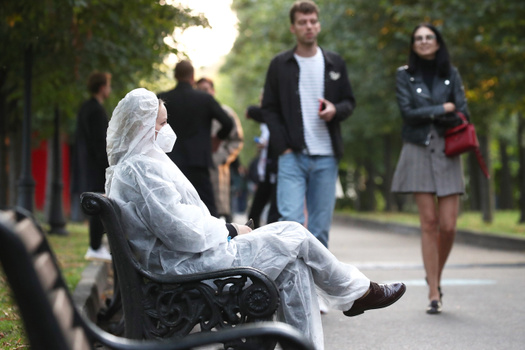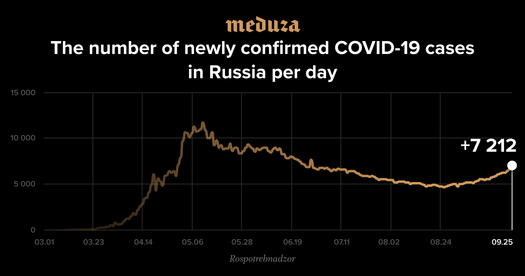
‘Nobody wants to kill business’ Moscow is experiencing a spike in coronavirus cases, but there’s no lockdown in sight
Мы говорим как есть не только про политику. Скачайте приложение.
Moscow is experiencing a sharp increase in new coronavirus cases. As of Friday, September 25, the Russian capital had recorded 1,560 new cases in the last day — 510 more than the day before and nearly twice as many as last week. This marks the highest daily increase the city has seen since June 12. “Yes, it’s a spike. We hope the healthcare system can cope,” a source close to Moscow’s leadership told Meduza, adding that the authorities don’t have any forecasts about future morbidity rates.
Also on September 25, Russia recorded more than 7,000 new coronavirus cases across the country. But the federal public health watchdog, Rospotrebnadzor, stated that “there’s no second wave to speak of,” since the “epidemic is developing as a continuation of the first wave.”

The Moscow authorities have started to roll out additional hospital beds. A source familiar with the situation told Interfax that over the next 10 days, eight of the city’s large hospitals will be reprofiled to accommodate coronavirus patients and temporary hospitals will be set up at the VDNKh exhibition ground, Sokolniki Park, and the Krylatskoye Ice Palace. “In total, 23 hospitals in Moscow will be ready to hospitalize people with suspected and confirmed COVID-19 [cases] by October 5. In addition, if necessary, temporary hospitals can be set up on the properties of another seven medical institutions,” the source added.
Moscow Mayor Sergey Sobyanin resumed self-isolation restrictions for elderly Muscovites and people with chronic illnesses. According to the new decree, as of September 28, these people can only leave their homes to go to work, visit a store or pharmacy, and go for walks — all while wearing masks and gloves. The mayor’s office underscored that there are no restrictions on walks and so elderly people won’t be fined for leaving their homes. Whether they will face any repercussions for visiting other public places, such as cafes or movie theaters, remains unclear. “All of us really don’t want to return to the harsh restrictions [we had] this spring. I hope that we can avoid this. But only if we take care of ourselves and the people close to us,” Sobyanin wrote on his blog.
Sobyanin urged employers to transfer their staff to remote work and take other measures to minimize the number of employees at workplaces. Yesterday, reports emerged that the Moscow Mayor’s Office had sent letters with this request to more than 5,000 of the capital’s largest companies. At the same time, Sobyanin ordered the designated authorities to strengthen control over compliance with anti-epidemic measures at enterprises.
The possibility of closing restaurants and cafes isn’t under discussion, two sources close to the mayor’s office told Meduza, noting that “nobody wants to kill business.” The city has yet to make any decisions about transitioning schools to distance learning; the authorities will make a decision based on the increase in the number of cases. However, Meduza’s source close to the Education Department says that a decision about switching to distance learning could be made as early as October 1. The source adds that so far, schools are operating on the following basis: if one child in a class contracts the coronavirus, the entire class is switched to distance learning. There isn’t any talk of other large-scale restrictions — Interfax and RIA Novosti’s sources have emphasized that the authorities aren’t planning to reintroduce the permit system or “shut down the [city’s] economy.”
Kremlin spokesman Dmitry Peskov also noted that there’s no talk of introducing any serious restrictions at the federal level. “The growth of these [morbidity] figures should, of course, be a reason for all of us to simply be much more careful and take care of our loved ones,” he said.
Story by Grigory Levchenko
Translation by Eilish Hart